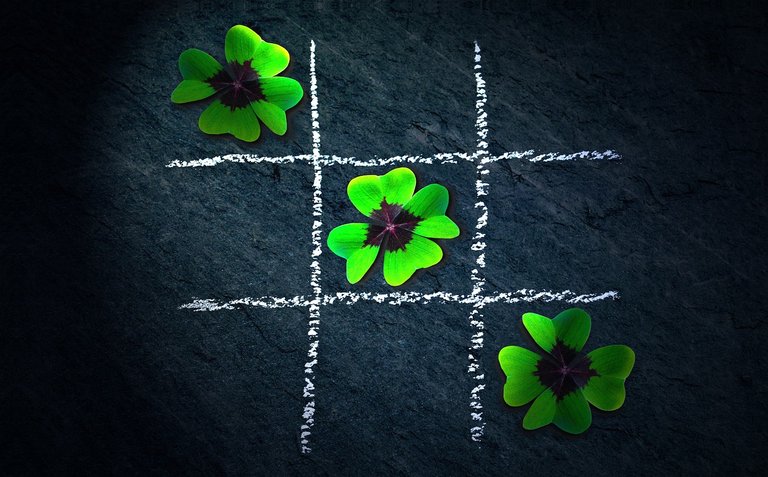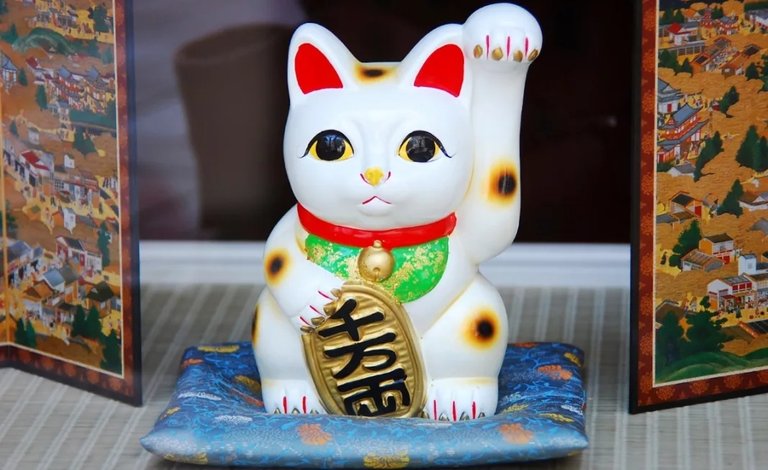Hello friends of Holos & Lotus.
I'm very pleased that @lilianajimenez brought back the topic of superstitions and beliefs, as I can contribute a bit of my perspective on this subject.

I previously said that I don't believe in superstitions. Even though my grandmother, who raised me, did believe in these superstitions and bad luck omens, I personally never did, nor do I.
However, I do respect people who believe. Even when they ask me to do something, in order to fulfill and respect their beliefs, I do it.
If they ask me not to walk under a ladder, I don't. If they ask me to find a little red ribbon, I'll find it, and so on.
There are several of these beliefs and superstitions that are based on or supported by scientific elements or random facts.
For example, my grandmother believed that to get a job, you had to dress in white.
She believed this as a kind of superstition. However, it's scientifically proven that the color white relaxes and inspires confidence, security, purity, and cleanliness; and therefore, I believe there's no better color to wear when going to a job interview or important meeting.
There is also a belief in Japan that the Maneki Neko, the cat that moves its paw, attracts money and brings good luck in life and business.
The legend of this lucky cat tells of a monk who was leaning against a tree when he saw a golden cat sitting on its hind legs, calling him by moving its paw.
When he decided to answer the cat's call, a lightning bolt struck the tree, reducing it to splinters and ashes.
Since then, these objects, which supposedly bring good luck, have been built. But in reality, the only one who was lucky was that monk who escaped a lightning strike.
I see it this way: superstitions are an exercise in faith.
If you have faith that you'll be lucky and that everything will go well, and you believe with all your heart that whatever you think will come true, then your prediction will most likely come true.
Faith moves mountains, and we, consciously or unconsciously, act in pursuit of faith, of our desires.
To support this, I bring you another testimony. The daughter of a friend of mine was about to audition for a very important performance and was nervous. She had studied hard, but she was unsure. Her grandmother approached her and gave her a wooden stick.
She told her to hold the stick tightly and ask it to give her strength and that everything would go well. Also, to make no mistakes and that the judges would like her performance.
My friend grabbed the stick and asked it with a faith she didn't even believe she had.
Of course, everything went swimmingly, and as soon as she finished, she went to find her grandmother to thank her and ask her, "What kind of stick was that wonderful one?"
Her grandmother, as casually as she could, told her it was just an ordinary orange stick, since it was the first one she found.
She explained that everything went well because she trusted and relaxed.
While my friend's daughter had faith in the stick and trusted it, everything went well. In the end, it was a matter of self-confidence, not religion or superstition.
That's why, although I don't believe in superstitions, I do believe in faith and I believe in those who believe. Therefore, as long as I can please them and fulfill their requests, I will do so and continue to do so.
Versión en español
Hola amigos de Holos & Lotus.
Me agrada mucho que @lilianajimenez haya traído de vuelta el tema de las supersticiones y las creencias, ya que puedo aportar un poco de mi punto de vista sobre este tema.

Anteriormente había dicho que no creo en supersticiones. Incluso, a pesar de que mi abuela quien me crió, sí creía en esta supersticiones y augurios de mala suerte, en lo personal, nunca creí ni creo.
Sin embargo, sí respeto a las personas que creen. Incluso, cuando me piden que haga algo, por tal de cumplir y respetar su creencia, yo lo hago.
Si me piden que no pase por debajo una escalera, no paso. Si me piden que busque un lacito rojo, yo lo busco y así.
Hay varias de estas creencias y supersticiones que están basadas o apoyadas en elementos científicos o en hechos casuales.
Por ejemplo, mi abuela creía en que para que se te diera algún trabajo, debías ir vestido de blanco.
Ella lo creía como una especie de superstición. Sin embargo, está científicamente probado que el color blanco relaja e inspira confianza, seguridad, pureza, limpieza; y por tanto, creo que no hay mejor color para vestirse cuando vamos a una entrevista de trabajo o reunión importante.
Existe también, en Japón, la creencia de que el Maneki Neko, el gato que mueve la pata, atrae el dinero y da buena suerte en la vida y en los negocios.
La leyenda de este gato de la suerte, cuenta que un monje estaba recostado un árbol cuando vio a un gato dorado, sentado sobre sus dos patas traseras y que lo llamaba moviendo la pata.
Cuando se decidió acudir al llamado del gato, un rayo impactó en el árbol, reduciéndolo a astillas y cenizas.
Desde entonces se han construido estos objetos, que supuestamente dan suerte. Pero en realidad, el único que tuvo suerte fue aquel monje que se salvó de rayo.
Lo veo de este modo: las supersticiones son un ejercicio de fe.
Si tienes fe en que tendrás suerte en que todo irá bien y crees de todo corazón que aquello que pienses se hará realidad, pues lo más probable es que se cumpla tu predicción.
La fe mueve montañas y nosotros, consciente o inconscientemente, accionamos en pos de la fe, de nuestros deseos.
Para argumentar esto les traigo otro testimonio.
La hija de un amigo mío se iba a presentar en una audición muy importante y se encontraba nerviosa. Había estudiado bastante, pero se encontraba insegura. Su abuela se acercó a ella y le dio un palito de madera.
Le dijo que agarrara con fuerza el palito y le pidiera que le diera fuerzas y que todo saliera bien. Además, que no se equivocara y que a los jueces les gustara su interpretación.
Mi amiga agarró el palito y le pidió con una fe que ni ella misma creía tener.
Por supuesto, todo salió a las mil maravillas y nada más que terminó, fue en busca de su abuela para agradecerle y preguntarle ¿qué tipo de palito era aquel, tan maravilloso?
Su abuela con la mayor naturalidad del mundo, le dijo que era un palito cualquiera de naranja, ya que fue el primero que encontró.
Le explicó que todo salió bien debido a que ella confió y se relajó.
Mientras que la hija de mi amigo tuvo fe en el palito y confió, todo salió bien. Al final, era un problema de confianza en sí misma y no de religión o superstición.
Por eso, aunque no crea en supersticiones, sí creo en la fe y creo en aquellas personas que creen. Por tanto, mientras pueda complacerlos y cumplir con lo que me piden yo lo haré y lo seguiré haciendo.

